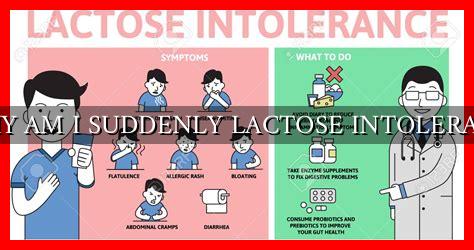-
Table of Contents
Why Am I Suddenly Lactose Intolerant?
Have you recently noticed that consuming dairy products leaves you feeling bloated, gassy, or experiencing stomach cramps? You may be one of the millions of people who have developed lactose intolerance later in life. This condition can be frustrating and confusing, but understanding the reasons behind it can help you manage your symptoms effectively.
What is Lactose Intolerance?
Lactose intolerance is the inability to digest lactose, a sugar found in milk and dairy products. This occurs when the body does not produce enough of the enzyme lactase, which is needed to break down lactose into simpler sugars that can be absorbed into the bloodstream. Without enough lactase, lactose remains undigested in the gut, leading to uncomfortable symptoms.
Common Symptoms of Lactose Intolerance
- Bloating
- Gas
- Diarrhea
- Stomach cramps
Possible Reasons for Developing Lactose Intolerance
Genetics
One of the most common reasons for developing lactose intolerance is genetics. Some people are born with a genetic predisposition to produce less lactase as they age, leading to lactose intolerance in adulthood.
. This is more common in certain ethnic groups, such as Asians, Africans, and Native Americans.
Illness or Injury
Illnesses or injuries that affect the small intestine, where lactase is produced, can also lead to temporary or permanent lactose intolerance. Conditions such as celiac disease, Crohn’s disease, or infections can damage the intestinal lining, reducing the production of lactase.
Age
As we age, our bodies naturally produce less lactase. This age-related decline in lactase production can lead to lactose intolerance in older adults. It is estimated that around 65% of the world’s population has some degree of lactose intolerance by adulthood.
Diagnosis and Management
If you suspect that you are lactose intolerant, it is essential to consult a healthcare professional for a proper diagnosis. This may involve a lactose tolerance test or a hydrogen breath test to measure how well your body digests lactose.
Once diagnosed, managing lactose intolerance involves avoiding or limiting dairy products that contain lactose. Fortunately, there are many lactose-free alternatives available, such as lactose-free milk, cheese, and yogurt. Additionally, lactase enzyme supplements can help digest lactose more effectively.
Conclusion
While developing lactose intolerance can be challenging, understanding the reasons behind it can help you make informed choices about your diet and manage your symptoms effectively. By working with a healthcare professional and making simple dietary adjustments, you can continue to enjoy a healthy and balanced diet without the discomfort of lactose intolerance.
For more information on lactose intolerance and dietary recommendations, visit Mayo Clinic.


